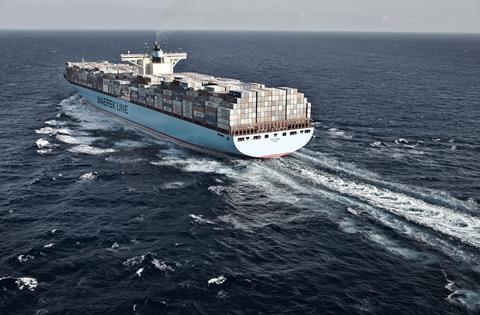Q1 saw the ”best earnings quarter ever” with growth across Ocean, Logistics and Terminals

AP Moller-Maersk has announced record results for the first quarter (Q1) of 2022 across its businesses, driven by ”higher rates and strong long-term partnerships with customers seeking end-to-end supply chain support”.
Revenue for the quarter was up 55 per cent year-on-year to US$19.3bn, EBITDA more than doubled to US$9.1bn and free cash flow increased to US$6bn, Maersk reported.
”In Q1 we delivered the best earnings quarter ever in AP Moller-Maersk with growth across Ocean, Logistics and Terminals,” said chief executive Søren Skou.
”The increased earnings are driven by freight rates and by contracts being signed at higher levels,” he continued. ”While global supply chains remain under significant pressure, we continue to demonstrate superior ability to help customers overcome logistic challenges.
”In Logistics, we enjoyed strong demand for products and solutions across our portfolio leading to the fifth quarter in a row with organic growth of more than 30 per cent,” Skou noted, ”while Terminals presented its best quarter ever.”
In Ocean, revenue increased 64 per cent to US$15.6bn during Q1 as strong rates more than offset a 7 per cent decline in volumes.
Revenue for the full year is expected to continue to be strong, Maersk confirmed, as the increase in freight rates on its long-term contract portfolio should add approximately US$10bn to revenue in 2022 compared to 2021.
”This will more than offset the significant increase in costs, which were up 21 per cent in the first quarter given higher fuel costs and inflationary pressure on network and container handling costs.”
Revenue in Logistics grew 41 per cent in the opening three months to US$2.9bn, while in Terminals it grew from US$915m to US$1.1bn.
In its market guidance, Maersk said that freight rates remained elevated in Q1 as Covid-19 and capacity shortages continued to disrupt the supply-side of the logistics industry.
Global container demand declined by 1.2 per cent compared to growth of 8 per cent in 2021, while global air cargo volumes increased by 2.9 per cent.
The company said that trade flow growth had flattened from Far East to both North America and Europe, while Russia’s invasion of Ukraine has had a negative impact on trade flows and consumer confidence in Europe.
”Given this background, global container demand is now expected to grow -1/+1 per cent, compared to an earlier expectation of 2-4 per cent,” it said.
Maersk is anticipating an underlying EBITDA of around US$30bn, an underlying EBIT of around US$24bn and a free cash flow above US$19bn for the full year of 2022.



